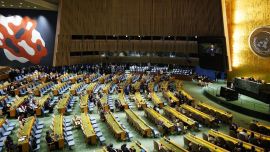President Alberto Fernández’s complete message to the nation, announcing his bid for abortion reform.
My dear Argentine people,
I have long been presenting the need for the pledged word to regain its value in Argentine politics. The word I pledge is always the expression of my firmest convictions, those which guide me permanently.
Throughout the electoral campaign, at my inauguration and when launching the parliamentary year, I undertook a commitment before you which I now come to fulfil.
I have submitted to Congress two bills for all women to have access to their right to integral health. The first legalises the voluntary interruption of pregnancy, guaranteeing that the health system permits it to be carried out in conditions which ensure their health and survival.
The second institutes the Programme of 1,000 Days with the aim of strengthening the integral health care of women during pregnancy and of their children in the first years of their lives.
My conviction, which I have always expressed publicly, is that the state should accompany all pregnant women in its maternity bills. But I’m also convinced that it is the state’s responsibility to take care of the lives and health of those who decide to interrupt their pregnancy during its first stages.
Criminalising abortion has served no purpose. It has only led to clandestine abortions with worrying figures. Every year around 38,000 women are hospitalised for this reason and since the return of democracy over 3,000 women have died as a result.
Legalising abortion saves women’s lives and preserves their reproductive capacity, often affected by unsafe abortions. It neither increases the number of abortions nor promotes them. It merely resolves a public health problem.
Furthermore, legalisation makes for less abortions and deaths thus caused, as has already happened in Mexico City and Uruguay. Offering health coverage also eases access to contraceptive methods to prevent unintended pregnancies.
Legalising abortion does not imply any extra charge for the health system. The procedures validated using World Health Organisation (WHO) standards mostly correspond to outpatient treatment, not surgical and pharmacological.
The debate is not about deciding whether or not there should be abortion. Abortions occur in clandestine form, placing at risk the health and lives of the women who submit to them. The dilemma we must overcome is whether abortions are to be clandestine or within the Argentine health system.
The most vulnerable and impoverished women are the biggest victims of our legal system. They must submit themselves to unsafe practices because they cannot afford the costs implied by an abortion. Many of them die in the attempt or suffer permanent health damage.
At the other end, the Programme of 1,000 Days seeks to lower the mortality and malnutrition, as well as to head off violence by protecting the early bonds, the emotional and physical development and integral health of the pregnant and their children up to three years of age.
This bill establishes new Integral Healthcare assistances which consists of the annual payment of an AUH (Asignación Universal por Hijo) family benefit to help look after each child up to the age of three, as well as extending payment of the AUE (Asignación Universal por Embarazo) pregnancy benefit. Until now the AUE covers six months – this bill extends it to nine months, covering the entire pregnancy. Finally, payments for birth and adoption will be extended to AUH recipients, who had been excluded from this benefit. There will be free public health provision of essential items for the pregnancy and early childhood, co-ordinating and broadening the existing programmes.
We thus seek to establish a special approach for the timely detection of risks during pregnancy, such as presumed thrombophilia. Free access to diagnostic studies and a model of specific care is provided. We are also taking advantage of this to create a system (Sistema de Alerta Temprana de Nacimientos y el Certificado de Hechos Vitales) with the aim of guaranteeing the new-born’s right to identity. The DNI identity card is a central tool for the effective exercise of rights.
Finally, fundamental gender policies are proposed as a priority for the prevention and early detection of situations of gender violence or sexual violence or abuses involving the pregnant, children and adolescents.
I am thus complying with my commitment to send both bills for their parliamentary debate following constitutional rules. I propose a frank debate within the framework of democratic dialogue.
Finally, I ask you, as President of all Argentines, to take care to respect those who think otherwise. The differences make us a pluralistic society, enriching the democracy which cost us so much effort to consolidate.
Out of personal conviction, I am sure that we are responding to a reality which affects public health, and that we are thus broadening rights within a society which demands it.
May it become law.
Thank you very much.
























Comments